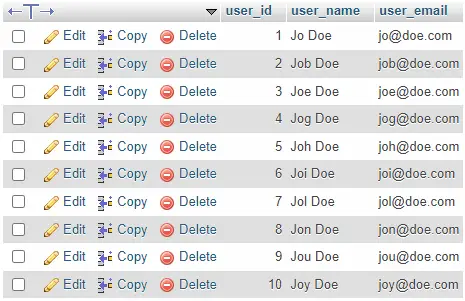Welcome to a tutorial on how to import an Excel spreadsheet with MySQL and NodeJS. So want to “put an Excel file into the database”? Well, it’s actually a simple process of “read the Excel file” and “insert into database”. Read on for the example!
TABLE OF CONTENTS
DOWNLOAD & NOTES
Here is the download link to the example code, so you don’t have to copy-paste everything.
EXAMPLE CODE DOWNLOAD
Just click on “download zip” or do a git clone. I have released it under the MIT license, so feel free to build on top of it or use it in your own project.
SORRY FOR THE ADS...
But someone has to pay the bills, and sponsors are paying for it. I insist on not turning Code Boxx into a "paid scripts" business, and I don't "block people with Adblock". Every little bit of support helps.
Buy Me A Coffee Code Boxx eBooks
IMPORT EXCEL IN NODEJS MYSQL
All right, let us now get into the example of importing an Excel file into MySQL.
QUICK SETUP
Run npm i mysql xlsx to install the required modules.
PART 1) DUMMY USER TABLE
CREATE TABLE `users` (
`user_id` bigint(20) NOT NULL,
`user_name` varchar(255) NOT NULL,
`user_email` varchar(255) NOT NULL
) ENGINE=InnoDB DEFAULT CHARSET=utf8mb4;
ALTER TABLE `users`
ADD PRIMARY KEY (`user_id`),
ADD UNIQUE KEY `user_email` (`user_email`),
ADD KEY `user_name` (`user_name`);
ALTER TABLE `users`
MODIFY `user_id` bigint(20) NOT NULL AUTO_INCREMENT, AUTO_INCREMENT=1;First, let us start with the database, by creating a very simple dummy users table to work with.
user_idThe user ID, primary key and auto-increment.user_nameUser’s name.user_emailUser’s email address.
PART 2) EXCEL FILE
| Jo Doe | jo@doe.com |
| Job Doe | job@doe.com |
| Joe Doe | joe@doe.com |
| Jog Doe | jog@doe.com |
| Joh Doe | joh@doe.com |
| Joi Doe | joi@doe.com |
| Jol Doe | jol@doe.com |
| Jon Doe | jon@doe.com |
| Jou doe | jou@doe.com |
| Joy Doe | joy@doe.com |
Next, I don’t think this needs any explanation. Just a bunch of users that we will import into the database.
PART 3) NODEJS IMPORT EXCEL
// (A) LOAD MODULES
// npm install mysql xlsx
// https://www.npmjs.com/package/mysql
// https://www.npmjs.com/package/xlsx
const mysql = require("mysql"),
xlsx = require("xlsx");
// (B) CONNECT TO DATABASE - CHANGE SETTINGS TO YOUR OWN!
const db = mysql.createConnection({
host: "localhost",
user: "root",
password: "",
database: "test"
});
// (C) OPEN EXCEL FILE - USE FIRST WORKSHEET
var workbook = xlsx.readFile("2-users.xlsx"),
worksheet = workbook.Sheets[workbook.SheetNames[0]],
range = xlsx.utils.decode_range(worksheet["!ref"]);
// (D) IMPORT EXCEL
for (let row=range.s.r; row<=range.e.r; row++) {
// (D1) READ CELLS
let data = [];
for (let col=range.s.c; col<=range.e.c; col++) {
let cell = worksheet[xlsx.utils.encode_cell({r:row, c:col})];
data.push(cell.v);
}
// (D2) INSERT INTO DATABASE
let sql = "INSERT INTO `users` (`user_name`, `user_email`) VALUES (?,?)";
db.query(sql, data, (err, results, fields) => {
if (err) { return console.error(err.message); }
console.log("USER ID:" + results.insertId);
});
}
// (E) DONE - CLOSE DB CONNECTION
db.end();
Lastly, I don’t think this needs a line-by-line explanation either…
- Import/load all the required modules. Yep, NodeJS does not have the native capabilities to directly connect to MySQL or read Excel files. Just make sure that you have both
mysqlandxlsxmodules installed properly. - Connect to the MySQL database.
- Read the Excel file.
- Read the cells, and insert them into the table.
EXTRAS
That’s all for the tutorial, and here is a small section on some extras and links that may be useful to you.
IMPORT EFFICIENCY
While the above example works, take note of how it processes row-by-row. That is actually very inefficient when dealing with large imports. So a small homework for those who are dealing with massive Excel files – Change that section to import multiple rows at once, that is, INSERT INTO `users` (`user_name`, `user_email`) VALUES (?,?), (?,?), (?,?), ...
ERROR CHECKING
Also, there is no error checking. We assume that there will always be 2 columns in the Excel file, in the correct order. So yep, you will want to add some “foolproofing checks” in your own project.
LINKS & REFERENCES
- MySQL – NPM
- SheetJS – NPM
- Import & Export CSV With NodeJS MySQL – Code Boxx
THE END
Thank you for reading, and we have come to the end. I hope that it has helped you to better understand, and if you want to share anything with this guide, please feel free to comment below. Good luck and happy coding!
